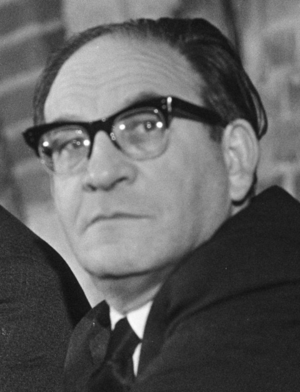Difference between revisions of "Fred Mulley"
(Wikipedia import) |
m (Text replacement - "e served in" to "e was in") |
||
| Line 33: | Line 33: | ||
==Early life== | ==Early life== | ||
| − | Mulley attended [[Warwick School]] between 1929 and 1936. He | + | Mulley attended [[Warwick School]] between 1929 and 1936. He was in the [[Worcestershire Regiment]] in the [[Second World War]], reaching the rank of [[sergeant]], but was captured in 1940 and spent five years as a prisoner of war in Germany. During this time he obtained a BSc in economics from [[University of London]] as an external student and became a chartered secretary.<ref name="wr">[http://www.worcestershireregiment.com/wr.php?main=inc/pow_F_W_Mulley Worcestershire Regiment (29th/36th of Foot) Web site]</ref> |
At the end of the war, he received an adult scholarship to [[Christ Church, Oxford]], and after a brief spell on an economics fellowship at the [[University of Cambridge]] (1948–50) he trained as a barrister, being called to the Bar in 1954. He also represented Great Britain's interests in the Consultative Assembly of the [[Western European Union]] (WEU) between 1958 and 1961 and was temporarily Vice-President of the Union and its Defense Committee.<ref name=spiegel>https://www.spiegel.de/spiegel/print/d-14323973.html</ref> | At the end of the war, he received an adult scholarship to [[Christ Church, Oxford]], and after a brief spell on an economics fellowship at the [[University of Cambridge]] (1948–50) he trained as a barrister, being called to the Bar in 1954. He also represented Great Britain's interests in the Consultative Assembly of the [[Western European Union]] (WEU) between 1958 and 1961 and was temporarily Vice-President of the Union and its Defense Committee.<ref name=spiegel>https://www.spiegel.de/spiegel/print/d-14323973.html</ref> | ||
Latest revision as of 03:09, 12 September 2024
(politician) | |||||||||||||||||||||||||||||||||||||||||||||||
|---|---|---|---|---|---|---|---|---|---|---|---|---|---|---|---|---|---|---|---|---|---|---|---|---|---|---|---|---|---|---|---|---|---|---|---|---|---|---|---|---|---|---|---|---|---|---|---|
 | |||||||||||||||||||||||||||||||||||||||||||||||
| Born | 3 July 1918 | ||||||||||||||||||||||||||||||||||||||||||||||
| Died | 15 March 1995 (Age 76) | ||||||||||||||||||||||||||||||||||||||||||||||
| Alma mater | Warwick School, Christ Church (Oxford), St Catharine's College (Cambridge) | ||||||||||||||||||||||||||||||||||||||||||||||
| Party | Labour | ||||||||||||||||||||||||||||||||||||||||||||||
British Labour politician who was Secretary of State for Defence 1976-1979.
| |||||||||||||||||||||||||||||||||||||||||||||||
Frederick William Mulley, Baron Mulley was a British Labour politician, barrister-at-law and economist.
Early life
Mulley attended Warwick School between 1929 and 1936. He was in the Worcestershire Regiment in the Second World War, reaching the rank of sergeant, but was captured in 1940 and spent five years as a prisoner of war in Germany. During this time he obtained a BSc in economics from University of London as an external student and became a chartered secretary.[1]
At the end of the war, he received an adult scholarship to Christ Church, Oxford, and after a brief spell on an economics fellowship at the University of Cambridge (1948–50) he trained as a barrister, being called to the Bar in 1954. He also represented Great Britain's interests in the Consultative Assembly of the Western European Union (WEU) between 1958 and 1961 and was temporarily Vice-President of the Union and its Defense Committee.[2]
Parliamentary career
Mulley had been a member of the Labour Party since 1936 and at the 1945 general election he unsuccessfully contested the constituency of Sutton Coldfield. He became Member of Parliament for Sheffield Park in 1950, a position he held until deselected by his local party prior to the 1983 general election, when his constituency disappeared in a redistribution of boundaries.
During a long career in politics Mulley held many ministerial positions including Minister of Aviation (1965–67), Minister for Disarmament (1967–69), and Minister of Transport (1969–70, 1974–75). While at the Transport Ministry he believed it would be inappropriate to be seen to be a car driver. Although he owned an Austin Maxi, his wife was the sole user of it during this period.[3]
In 1975 Harold Wilson brought him into the Cabinet as Secretary of State for Education and Science, and in 1976 became Secretary of State for Defence.
He fell asleep during the Queen's Jubilee Review of the Royal Air Force at RAF Finningley in 1977 when there was considerable noise around him. Having a small sleep during exercise was referred to by members of the RAF as having a "Fred Mulley". It was suggested in Private Eye that Mulley was guilty of treason (then still a capital offence) for having slept with the Queen.
House of Lords
After retiring from the House of Commons in 1983, he was created a life peer as Baron Mulley, of Manor Park in the City of Sheffield on 30 January 1984,[4] and he held a variety of directorial positions.
In June 1980, Mulley was elected President of the Western European Union Consultative Assembly, succeeding Kai-Uwe von Hassel.[2]
References
- ↑ Worcestershire Regiment (29th/36th of Foot) Web site
- ↑ a b https://www.spiegel.de/spiegel/print/d-14323973.html
- ↑ "Election special: Who's hand on the wheel?". Autocar. 141 (nbr 4067): 39–40. 5 October 1974.
- ↑ https://www.thegazette.co.uk/London/issue/49636/page/1499
Wikipedia is not affiliated with Wikispooks. Original page source here